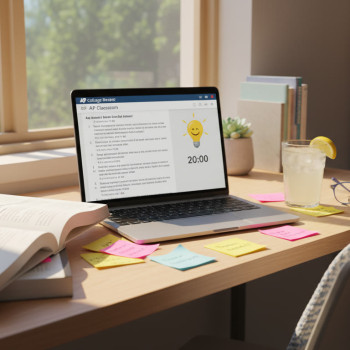Welcome: Why Honors and AP Acceleration Matters in South Carolina
If you’re a student in South Carolina—or a parent guiding one—you’ve probably heard the terms honors, Advanced Placement (AP), and acceleration thrown around in guidance counselor meetings, transcript reviews, and college-planning conversations. Those words aren’t just educational buzz; they represent intentional choices that shape learning, foster academic confidence, and can meaningfully influence college admission and placement.
This piece is a friendly, realistic roadmap. It explains how honors and AP acceleration work in South Carolina classrooms, how to decide when to accelerate, practical study approaches for success on AP exams, and how tailored support such as Sparkl’s personalized tutoring (1-on-1 guidance, tailored study plans, expert tutors, and AI-driven insights) can fit naturally into a student’s plan.
Understanding the Framework: AP Courses, the Course Audit, and What Schools Must Do
First, let’s set the foundation. AP courses are college-level classes taught in high school. To be labeled and recognized as an AP course, the school and teacher follow a specific authorization process that ensures the course meets College Board expectations. This process—commonly called the AP Course Audit—helps guarantee that AP-labeled classes are designed to build the depth and skills needed for the AP exam.
Why does this matter? Colleges and universities expect transparency: an AP label should mean the course covers the rigor outlined by the College Board. For South Carolina families, this means you can trust that properly audited AP courses are intentionally designed to prepare students for college-level work and the AP exam.
How Schools Offer AP (and Why You Should Ask About It)
- Course Authorization: A teacher or school administrator completes an authorization process each year so the course can officially be called “AP.”
- AP Classroom Access: Authorized teachers get tools like topic questions, progress checks, and AP Daily videos that help students prepare.
- Course Ledger Visibility: Authorized courses are listed in an official ledger that colleges can check to verify AP offerings on a transcript.
Practical tip: Ask your school’s AP coordinator whether a specific AP class is authorized and whether the teacher uses AP Classroom resources. If you’re weighing whether to choose an AP or honors path, knowing whether the course is fully supported matters.

Honors vs. AP vs. Acceleration: What’s the Difference?
Schools use a few mechanisms to accelerate learning. Here’s a short comparison to clear the fog:
- Honors Courses: Faster-paced and deeper than standard classes, but not necessarily aligned to a national exam. They strengthen skills and content knowledge and often prepare students for AP or dual-enrollment courses.
- AP Courses: Nationally standardized (in expectations) and aligned to an AP exam that can earn college credit or placement. Successful AP work demonstrates readiness for college-level study.
- Acceleration: Moving through material more quickly or skipping a level (for example, taking Algebra II as a freshman and Precalculus as a sophomore). Acceleration can happen inside honors or AP tracks, and it should be matched to a student’s preparedness and long-term goals.
Choosing between these paths isn’t always about prestige. It’s about fit. A student who thrives on problem-solving might jump into an accelerated math track and later take AP Calculus; another student might take honors classes to build confidence before entering AP English.
When Acceleration Makes Sense
- The student demonstrates strong mastery of prerequisite skills (grades, teacher recommendations, and diagnostic assessments can help determine this).
- The student can handle the time commitment and workload without sacrificing mental health or extracurricular balance.
- Acceleration aligns with longer-term goals—such as AP courses that lead to college credit or strengthen a college application in a chosen field.
Practical Steps for Students and Parents in South Carolina
Here’s a step-by-step plan you can adapt based on your school and the student’s strengths.
1) Start with a Conversation (Counselor, Teacher, and Family)
Bring together the student, parent, counselor, and the prospective course teacher. Discuss readiness, course workload, and how the choice affects the transcript. In South Carolina, counselors can also help you understand how courses will be weighted on a GPA and how many AP classes are commonly offered at your school.
2) Review the Course Syllabus and Authorization
Ask for the course syllabus and whether the class is officially authorized. An authorized AP course will have aligned expectations and access to AP Classroom resources—this materially helps exam preparation.
3) Understand the Sequence and Gateways
Some AP classes have natural prerequisites—for instance, AP Biology makes most sense after a rigorous biology and chemistry foundation. Ask teachers which prior courses best prepare students for success.
4) Build a Strategic Schedule
A balanced plan might include one or two AP courses per year, with honors classes filling out the schedule. Overloading on APs early can be risky; a paced approach helps maintain strong grades and well-being.
5) Add External Support When Needed
Targeted help is a force multiplier. One-on-one tutoring—like Sparkl’s personalized tutoring with tailored study plans and expert tutors—can accelerate progress without burning out the student. It’s particularly effective for students stepping up from honors into AP or preparing for an AP exam with a specific score goal.
How to Succeed in AP Courses and on AP Exams
AP success blends content knowledge, test strategy, and disciplined study habits. Below are actionable strategies that have helped students move from “I can try AP” to “I can score a 4 or 5.”
Build a Study Calendar (Backwards from Exam Day)
- Map out the AP exam date and count backward. Schedule topic reviews, practice exams, and rest days.
- Use smaller time blocks regularly—45–90 minutes of focused study beats 4-hour cram sessions.
Prioritize AP Classroom and Practice Materials
Teachers approved through the Course Audit can assign AP Classroom topic questions and progress checks. Those tools are focused and exam-aligned. Combine them with released practice questions and full-length practice exams under timed conditions.
Active Study Techniques
- Explain concepts aloud as if teaching someone else—this reveals holes quickly.
- Create a habit of quick daily retrieval practice: flashcards, summary quizzes, or short written prompts.
- For essay-based AP tests, practice timed writing and get targeted feedback on structure and evidence use.
Practice Tests and Review Tables
Practice exams are the single most reliable predictor of test-day performance. Take them under realistic conditions, then create a focused review that targets your weakest scoring sections.
| Study Element | Frequency | Purpose |
|---|---|---|
| Topic Questions/Progress Checks | Weekly | Diagnostic feedback and content mastery |
| Timed Practice Exams | Every 3–6 weeks | Simulate test environment and pacing |
| Targeted Tutoring Sessions | 1–2 times weekly (as needed) | Clarify tough concepts, exam strategies, and feedback |
| Written Response Practice | Biweekly | Improve evidence use, structure, and timing |
Balancing Rigor and Well-Being
Acceleration makes sense only when students can sustain it. Colleges look for a transcript that shows upward trajectory, strong performance, and intellectual curiosity—not burnout. Here are ways to balance rigor with resilience.
Protect Time for Rest and Interests
- Keep at least one block of free time each week for hobbies, family, or just decompressing.
- Sleep is non-negotiable; cognitive performance drops sharply with inadequate rest.
Use a Growth Mindset
AP classes are challenging by design. Encourage students to view mistakes as feedback. A single lower score doesn’t define potential—what matters is reflection and targeted improvement.
Know When to Adjust
If grades or mental health decline, it can be better to move from AP to honors or reduce the number of APs for a year. Colleges prefer consistent, strong performance over a transcript full of withdrawals or failing grades.
How Acceleration and AP Fit into College Planning in South Carolina
AP coursework can do several things for college planning:
- Strengthen an application by showing willingness to take demanding courses.
- Potentially earn college credit or placement—reducing time and cost in college when exams and college policies align.
- Provide a clearer signal of academic interests; a run of AP science courses suggests a STEM orientation, for example.
Remember: policies for accepting AP scores for credit vary by college. In-state public universities often publish specific score and credit policies. When planning, compare the student’s likely course needs with local college policies—this makes acceleration decisions more strategic.
Real-World Examples and Course Pathways
Here are some typical high-school-to-college pathways that families use as models. These are not prescriptive, but they reveal practical ways to layer honors and AP.
Sample Pathway: Future Engineer
- Freshman: Honors Algebra II or Geometry (accelerated)
- Sophomore: Honors Precalculus; AP Physics 1
- Junior: AP Calculus AB/BC; AP Physics C or AP Chemistry
- Senior: AP Computer Science A; AP Calculus BC (if not already taken) or advanced dual-enrollment math
Sample Pathway: Future Humanities Major
- Freshman: Honors English
- Sophomore: Honors World History; AP English Language (if ready)
- Junior: AP English Literature; AP U.S. History or AP European History
- Senior: AP Seminar or AP Research; AP Psychology or AP Government
How Targeted Support Amplifies Results
One-on-one guidance can make the difference between a stressful scrape and a confident, top-score performance. Personalized tutoring helps in several ways:
- It identifies and addresses gaps quickly so students don’t fall behind.
- Tutors tailor practice to the student’s learning style—visual, verbal, or kinesthetic—so study time is efficient.
- Regular check-ins keep students accountable and emotionally supported through the ramp-up to exam day.
For families exploring paid support, seek tutors or programs that integrate with classroom materials and produce specific plans—example features include individualized pacing plans, weekly target goals, and data-driven feedback. Sparkl’s personalized tutoring is one model that offers 1-on-1 guidance, tailored study plans, expert tutors, and AI-driven insights to help students focus on the right content at the right time.

Common Concerns Parents Ask (And How to Answer Them)
“Will AP classes make my child miserable?”
Not necessarily. If a student is pushed into more APs than they can handle, stress follows. The key is fit: choose a manageable pace and provide support—time management skills, tutoring, and open communication about stress levels.
“Does every student need AP classes to get into top colleges?”
Not every student. Colleges look for students who challenge themselves within the context of what’s available at their school. A student who takes every available rigorous course and earns strong grades stands out more than someone who overreaches and underperforms.
“Should we prioritize APs for college credit?”
AP credit can save time and money, but it’s not the only benefit. AP courses train students in college-level thinking. If local colleges accept specific AP scores for credit, that’s an added bonus—but don’t choose courses solely for potential credit without considering fit and readiness.
Checklist: Preparing for an AP-Accelerated Year
- Confirm AP Course authorization at your school and ask about AP Classroom use.
- Meet with the teacher and counselor to discuss prerequisites and workload.
- Create a study calendar with practice tests and weekly goals.
- Plan for targeted help where needed—tutoring or small-group sessions.
- Keep track of mental well-being and adjust the plan if grades or health suffer.
Final Thoughts: Make the Path Yours
Honors and AP acceleration in South Carolina are powerful tools when used thoughtfully. They open doors to college-level learning, demonstrate academic ambition, and—when combined with smart support—can lead to strong AP results that support college plans. But acceleration is not a checkbox; it’s a personalized journey that depends on the student’s strengths, goals, and balance.
Start with honest conversations, gather information from your school, and build a plan that includes steady practice, realistic pacing, and targeted help when needed. Whether that help comes from an experienced teacher, a caring tutor, or a personalized program like Sparkl’s tailored 1-on-1 tutoring and data-driven insights, the right support makes acceleration sustainable and rewarding.
Above all, remember that college-readiness is a marathon, not a sprint. Honors and AP courses can be thrilling milestones along the way—if they’re matched to the student who will thrive in them.
Ready to Start?
If you want to map a specific AP pathway, create a study calendar based on your student’s exam dates, or discuss how personalized tutoring might fit into your plan, take the next step: talk to your school counselor, review the AP syllabus for your chosen course, and consider a short trial of personalized support to see how it fits your student’s learning style. Small, intentional steps build the most confident results.















No Comments
Leave a comment Cancel